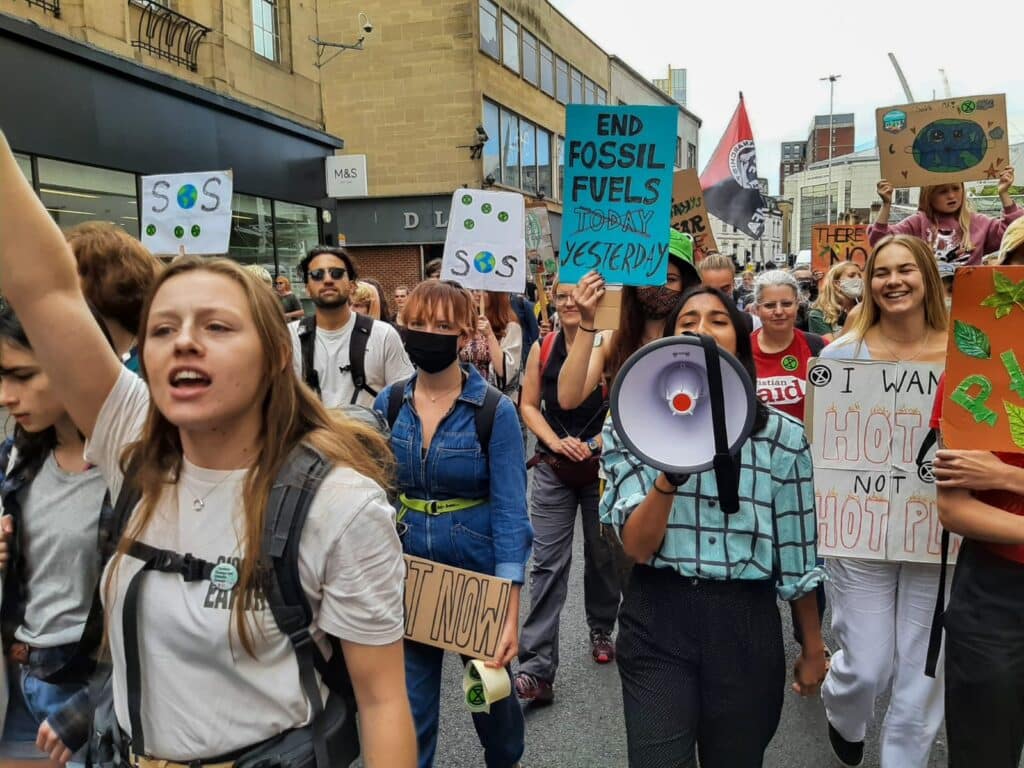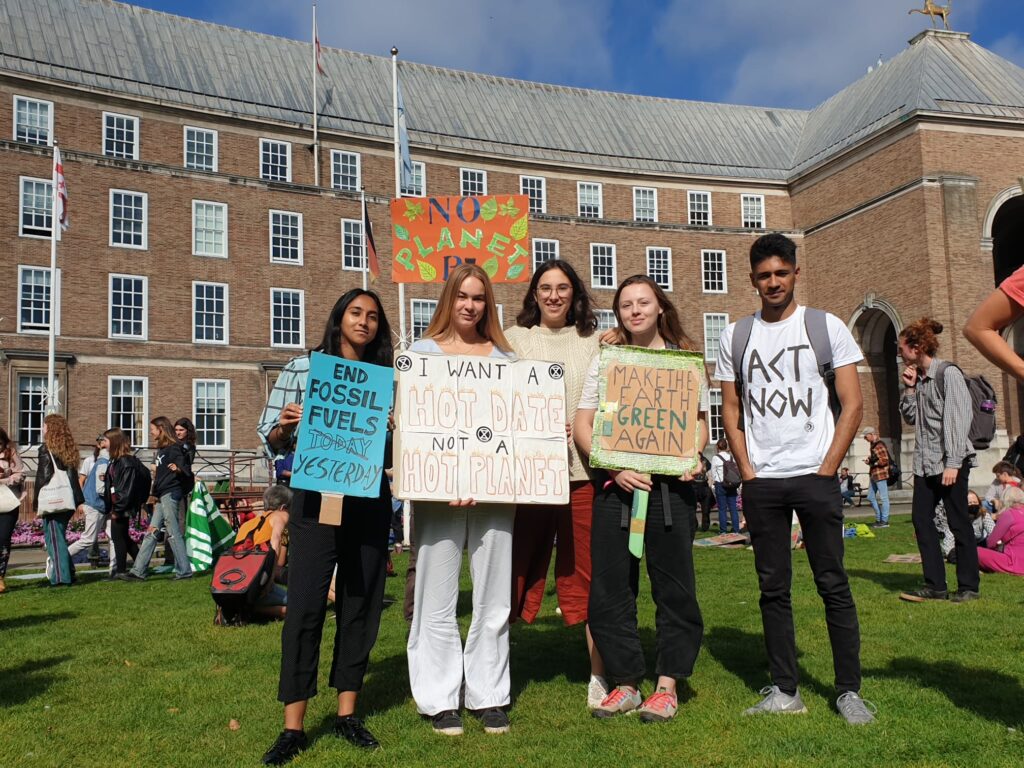
Q+A with UK-Based Agency Greenhouse Communications
Greenhouse is a communications agency with a mission to power positive change. In this guest blog post with Green 2.0, Joe Dillon and Gabriella Smith from Greenhouse Communications discuss the agency’s work in the U.K. environmental sector and how to better address the climate crisis in advance of next month’s 2021 United Nations Climate Change Conference (COP26). Last spring Greenhouse featured Green 2.0 Executive Director Andres Jimenez in a profile on green pioneers.
Q: What kind of work is Greenhouse Communications doing to drive positive social and environmental change?
Greenhouse Communications works with entrepreneurs, pioneers, and NGOs, focusing on the areas where we can make the most impact, to accelerate and scale solutions to climate change. We support clients in campaigns to build and support a sustainable economy, from working with entrepreneurs on clean technologies, to building and supporting powerful coalitions and successfully using the levers of financial markets and the law to drive accountability.
The work we do is very varied – whether it’s celebrating inter-governmental collaboration like on Mission Innovation 2.0 with the launch of an announcement from 23 states on the investment in clean energy innovation, to supporting the youth movement to engage politicians with Mock COP26, or launching Carbon Tracker research exposing major oil companies’ climate policies.
In 2020/21 the growing interest in climate change and the demand for government action meant that we doubled our team from 30 to nearly 60 people, investing in expertise across media, digital, social, and public affairs, to enable us to deliver outstanding service and results for our clients.
We delivered over 70 campaigns to address the climate crisis, tackle biodiversity loss, campaign for climate justice, drive innovation, and accelerate the transition to a global green economy.

Q: What strategies are being used in the U.K. to combat environmental issues such as climate change and rising levels of CO2 emissions?
As the host nation of the 2021 United Nations Climate Change Conference (COP26), the U.K. needs to lead from the front and show real climate leadership. The recent IPCC report has shown us not only the threat to humanity but also that we need to act now and half our emissions by 2030. Net-zero by 2050 is just not enough. COP26 may be the last chance we get to form a strong, collaborative strategy to save and protect the planet and biodiversity for future generations.
We have witnessed a dramatic change in public understanding of the climate crisis this year, as we experience climate impact globally – from heatwaves, to wildfires, to flooding. These tangible effects of climate change have driven home the fact that we are facing a climate emergency and that we need policymakers to take action. More and more people are taking their governments to court to try to make them legally accountable.
In policy terms, U.K. climate legislation was made in 2008; the Climate Change Act committed us to an overall cut in emissions of at least 80 percent by 2050, from 1990 rates. In 2019 this was amended with a target of achieving net-zero emissions (100 percent) by 2050. Other policy measures include specific carbon taxes and heavy subsidies for the green energy sector, and cleantech research and development.
Although progress has been made, for example in reaching 42 percent energy generation from renewables in 2020, it has not been enough. The U.K is still projected to fall short of its Paris Agreement commitments unless more radical changes are made fast. This lack of action is compounded by a government that is still encouraging a new coal mine, the development of an oilfield, and state subsidies across dirty fossil fuel industries.
In business, the U.K. green sector is booming and worth an estimated 200 billion pounds – that’s four times more than our manufacturing sector. With this boom has come both economic growth and new green jobs. From green transport, to clean energy and green investment, our climate-related businesses have been flourishing.
Q: In what ways can the United States and the U.K. work together to create a world where frontline communities receive the resources and support needed?
The election of President Joe Biden and the rapid and crucial shift in U.S. climate policy was a critical moment in the U.K./U.S. joint fight against climate change. As two of the world’s largest economies, we have both set out to be world leaders on sustainability.
British Prime Minister Boris Johnson has made clear that at COP26 he wants international investment to be near the top of the agenda. Global South countries, or those dealing with more climate risk due to their location, need the support of Global North countries to transition to a cleaner world. In the U.K. we have increased our international climate finance by 50 percent to a projected 11.6 billion pounds between 2021 and 2026. The understanding that the world can only recover as fast as the slowest transitioning economies is crucial to any individual country’s fight against climate change.
The U.S. and U.K. are both global innovation hubs and the historical closeness of our two nations have allowed for massive skill, and technology sharing between the two. Just this year we announced a joint science and technology partnership, aiming to strengthen the relationship between the two countries, create new jobs and protect the security of citizens. These partnerships and resulting innovations allow the green industrial revolution to increase its pace.
We can see how collaboration is driving ambition and enabling innovation, but there’s a much larger advantage to the U.K./U.S. partnership: global leadership. To avoid climate catastrophe it is not just individual countries that need to cut down on emissions; globally we need to reduce emissions by 7.6 percent every year for at least the next decade to meet the Paris Agreement goal of a 1.5 degrees Celsius temperature rise. This is not a challenge for each nation but rather for the global economy as a whole.
The main theme at COP26 will be international climate finance – where Global North countries need to provide support to ensure all countries can transition to net-zero or below. Without this aid, many Global South countries will not be able to afford to cut emissions without significantly damaging the wellbeing of their citizens.
Similar to how the Marshall plan helped restore Europe’s economy post World War II, we need a new generation of U.K./U.S. global aid and leadership to ensure that the global sustainability transition is just, swift, and encourages the green growth and jobs needed so that we make sure the most vulnerable are not left behind.
Q: What is your organization doing internally and externally to move the needle on diversity and equity?
We are in a climate emergency and need people from all walks of life to come together to be part of the solution. Greenhouse Communications embraces and celebrates diversity. We recognize that there can be no climate justice without racial justice and we want to use our skills to help change the systems which perpetuate inequality.
Last year we established an anti-racism task force and committed to taking steps to educate ourselves and improve our own diversity and inclusion practices. The task force meets weekly and invites guest speakers to address the team on a quarterly basis to share relevant resources and other educational tools. This year we discussed methods to decolonize climate activism in the media led by climate activist Suzanne Dhaliwal.

We also pioneer a regenerative business model which invests one percent profit for the planet and 30 percent of consultancy time pro-bono to help mission-driven NGOs and smaller enterprises driving positive change. An example of the pro bono communications support we provide is to the Black & Green Ambassadors, an initiative launched in 2014 which seeks to connect, empower and celebrate diverse leadership in the sustainability sector.
As a growing dynamic agency, we recognize that there is more we need to do to diversify our organization and that it’s a continual journey. At every stage, we take input and welcome feedback from the wider team and hold accountability at all levels. We hope to continue to foster an inclusive and open environment for conversations around culture and inclusivity – both within Greenhouse and across the whole sector.

To learn more about Greenhouse Communications visit https://www.greenhouse.agency/ and follow the agency on Twitter at @GreenhouseComms.
